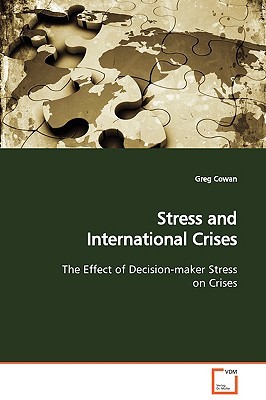
- We will send in 10–14 business days.
- Author: Greg Cowan
- Publisher: VDM Verlag
- ISBN-10: 3639074882
- ISBN-13: 9783639074888
- Format: 15.2 x 22.9 x 0.8 cm, minkšti viršeliai
- Language: English
- SAVE -10% with code: EXTRA
Stress and International Crises The Effect of Decision-maker Stress on Crises (e-book) (used book) | bookbook.eu
Reviews
Description
In the field of foreign policy analysis, there is a long history of research examining factors that impact decision making in conflicts and crises. This book examines factors affecting leaders' decision making during international crises. A statistical analysis was conducted using data from the International Crisis Behavior Project. The key variable examined was decision- maker stress. Analyses were performed in order to determine the relationship between decision-maker stress and various crises attributes and outcomes related to decision making. The crisis attributes and outcomes examined were the amount of time between crisis trigger and crisis response, the size of the decision-making unit in a crisis, the type of crisis management response, the likelihood of definitive outcomes, and the tension level among crisis actors following a crisis. The statistical analyses were conducted separately on non-protracted conflict crises and protracted conflict crises. Results indicate that increases in decision-maker stress do impact crises, and stress affects crises differently in protracted conflict and non- protracted conflict crises.
EXTRA 10 % discount with code: EXTRA
The promotion ends in 22d.15:30:31
The discount code is valid when purchasing from 10 €. Discounts do not stack.
- Author: Greg Cowan
- Publisher: VDM Verlag
- ISBN-10: 3639074882
- ISBN-13: 9783639074888
- Format: 15.2 x 22.9 x 0.8 cm, minkšti viršeliai
- Language: English English
In the field of foreign policy analysis, there is a long history of research examining factors that impact decision making in conflicts and crises. This book examines factors affecting leaders' decision making during international crises. A statistical analysis was conducted using data from the International Crisis Behavior Project. The key variable examined was decision- maker stress. Analyses were performed in order to determine the relationship between decision-maker stress and various crises attributes and outcomes related to decision making. The crisis attributes and outcomes examined were the amount of time between crisis trigger and crisis response, the size of the decision-making unit in a crisis, the type of crisis management response, the likelihood of definitive outcomes, and the tension level among crisis actors following a crisis. The statistical analyses were conducted separately on non-protracted conflict crises and protracted conflict crises. Results indicate that increases in decision-maker stress do impact crises, and stress affects crises differently in protracted conflict and non- protracted conflict crises.


Reviews